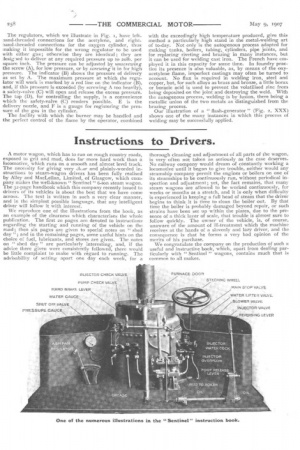Instructions to Drivers.
Page 22

If you've noticed an error in this article please click here to report it so we can fix it.
A motor wagon, which has to run on rough country roads, exposed to grit and mud, does far more hard work than a locomotive, which runs on a smooth and almost level track. The necessity for giving very char and plainly-worded instructions to steam-wagon drivers has been fully realised by Alley and MacLellan, Limited, of Glasgow, which company makes the well-known " Sentinel " 6-ton steam wagon. The 32-page handbook which this company recently issued to drivers of its vehicles is about the best that we have come across. The text is written in such a very clear manner, and in the simplest possible language, that any intelligent driver will follow it with interest.
We reproduce one of the illustrations from the book, as an example of the clearness which characterises the whole publication. The first 20 pages are devoted to instructions regarding the starting and running of the vehicle an the road ; then six pages are given to special notes on " shed day "; and in the remaining pages, some useful hints on the choice of fuel, lubricants, and stores are given. The notes on " shed day " are particularly interesting, and, if the advice there given were consistently followed, there would be little complaint to make with regard to running. The advisability of setting apart one day each week, for a
thorough cleaning and adjustment of all parts of the wagon, is very often not taken as seriously as the case deserves. No railway company would dream of constantly working a locomotive until it began to give trouble, neither would any steamship company permit the engines or boilers on one of its steamships to be continuously run, without periodical inspection and adjustment; yet, the fact remains, that many steam wagons are allowed to be worked continuously, for weeks or months at a stretch, and it is only when difficulty is experienced in keeping a full head of steam that the driver begins to think it is time to clean the boiler out. By that time the boiler is probably damaged beyond repair, or such strains have been set up within the plates, due to the presence of a thick layer of scale, that trouble is almost sure to follow quickly. The owner of the vehicle, is, of course, unaware of the amount of ill-treatment which the machine receives at the hands of a slovenly and lazy driver, and the consequence is that he forms a very bad opinion of the merits of his purchase. We congratulate the company on the production of such a useful and instructive book, which, apart from dealing particularly with " Sentinel " wagons, contains much that is common to all makes.


























